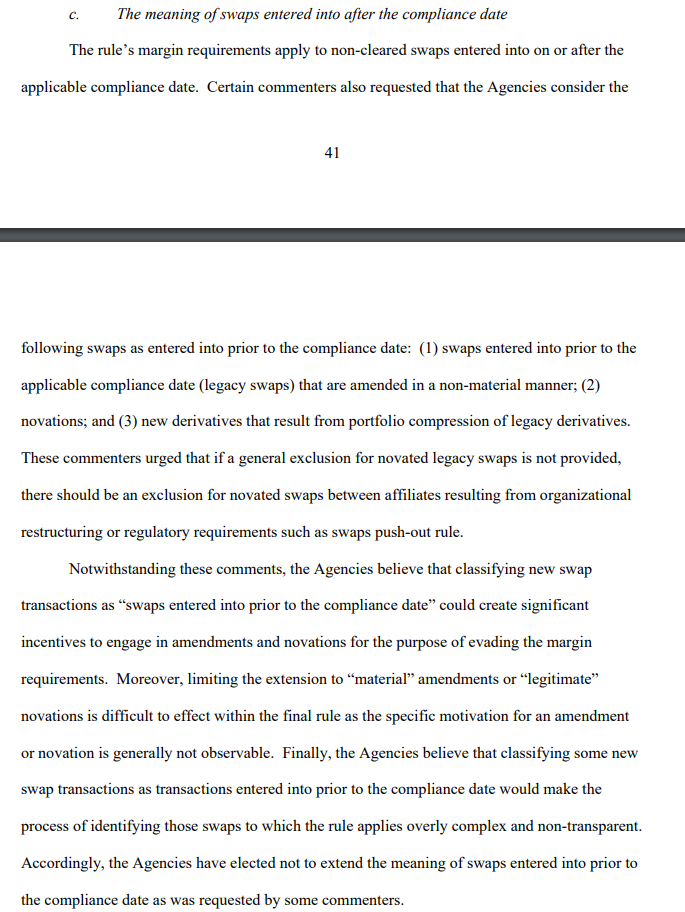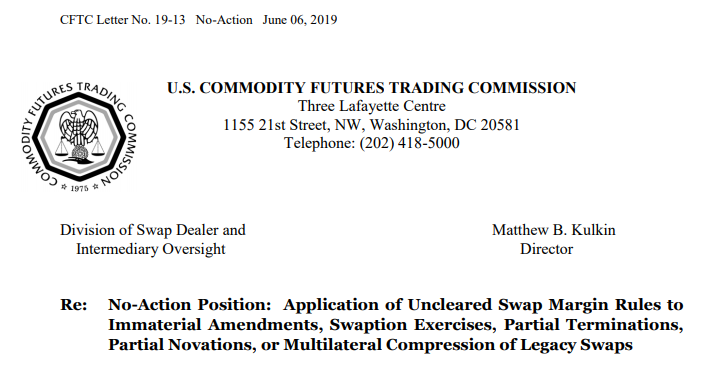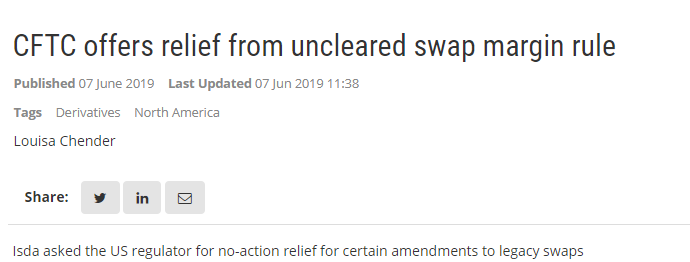- LIBOR fallbacks and Uncleared Margin Rules are hot topics across the industry.
- We highlight the Basel guidance that any amendments to LIBOR contracts as a result of Benchmark reform will not trigger the need to post margin.
- This is important guidance to ensure the uptake of new RFRs is simple.
Two of our big blog topics over the recent past have been about a) LIBOR fallbacks and b) Uncleared Margin Rules.
This blog will deal with the intersection of the two.
Specifically, if a LIBOR contract is amended so that it can either fallback to a Risk Free Rate, or is compressed and replaced with an RFR contract, will the new contracts be subject to Uncleared Margin Rules?
Why do we need this blog?
The guidelines of the Uncleared Margin Rules from back in March 2015 are pretty transparent:
8.10: Initial margin requirements will apply to all new contracts entered into during the periods described above. Applying the initial margin requirements to existing derivatives contracts is not required.
BCBS Margin requirements for non-centrally cleared derivatives
And footnote 20 goes even further;
Genuine amendments to existing derivatives contracts do not qualify as a new derivatives contract. Any amendment that is intended to extend an existing derivatives contract for the purpose of avoiding margin requirements will be considered a new derivatives contract.
Footnote 20, BCBS Margin requirements for non-centrally cleared derivatives
That seems pretty clear, But…
It Depends On The Jurisdiction
Unfortunately, when these BCBS guidelines were actually put into action by individual jurisdictions, it looks like some have been more strict than others. From MLex;

Showing that there is some concern in the US that amendments to contracts might trigger the Uncleared Margin Rules.
Indeed, when I look back at Amir’s October 2015 blog on Final US Rules On Margin For Non-Cleared Swaps, I see that the final rule in the US does make mention of amendments and novations;

The wording above seems sufficiently vague to warrant some further clarification.
That is where the BCBS comes in…
BCBS To the Rescue!

Recognising that interest rate benchmark reforms may require amending derivatives contracts, the BCBS (Basel Committee on Banking Supervision) published this guidance in March 2019;

Amendments to legacy derivative contracts pursued solely for the purpose of addressing interest rate benchmark reforms do not require the application of the margin requirements
BCBS March 2019
That seems crystal clear to me that any action related to the demise of an ‘IBOR will not suddenly trigger Uncleared Margin Rules.
Why Are we Worried About This?
The BCBS guidance is pretty clear, and it is very useful that they have issued it in good time. Now let’s hope that jurisdictions can implement it fast enough.
It is worth noting why this type of guidance has been necessary:
- Any Compression Auction for RFRs will be much more efficient if old contracts and new contracts can be terminated friction free – i.e. without changing their Initial Margin status.
- CCPs are exploring compensation schemes for amending PAI calculations to a new RFR e.g. SOFR. These may involve associated hedge trades for the discounting risk. Whilst these hedges will always be subject to IM at a CCP, if bilateral markets pursue a similar process then it is good to know that those hedges are likely to be exempt from UMRs.
- Any mass transfer of LIBOR positions into RFR positions is likely to involve a mixture of pre-UMR and post-UMR trades. Regulators need to be crystal clear on the status of the new RFR trades.
The CFTC No Action Position
And in a timely manner, the CFTC issued a No-Action Position regarding Legacy Swaps and Uncleared Margin Rules. You can read the ruling here.

This CFTC document does not seem to make explicit mention of benchmark reform, so it may well have been issued for entirely different reasons – seemingly at the behest of ISDA – see below:

It may just be that I happened to read that CFTC No Action Position at the same time as writing this blog and they are entirely unrelated.
In which case, are we expecting another No Action Position specifically for Benchmark Reform from the CFTC? Subscribe to the blog to stay informed!
What’s Next?
In the efforts to make sure that benchmark reform doesn’t hit any snags, it looks like ISDA are now tackling the Accounting side of things. Specifically, they want to ensure that any Hedge Accounting relationships stay in-tact during and after the transition. This sits nicely with the idea that amending legacy swaps to new RFRs should be frictionless, neither creating margin requirements nor breaking hedge relationships.
Whilst Accounting isn’t a typical subject we would cover, please let us know in the comments below if this is of particular interest to you and we can do a follow-up blog in more detail.
In Summary
- Amendments to LIBOR swaps as a result of benchmark reform should not trigger the Uncleared Margin Rules.
It’s nice to have a blog that can be summarised with a single line for once!

Thanks for your coverage of these interesting and hot topics!
Please follow up on the discussions regarding hedge accounting as this potentially can have large P/L impact for institutions.